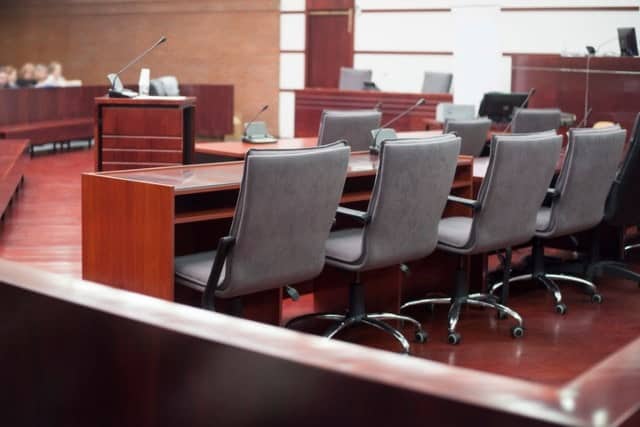The Basics of a Plea Bargain
To fully understand how to get a plea bargain, you first must learn what it is. To put it simply, plea bargains happen when the defendant pleads guilty to one or more charges against them. In return, the defendant will be charged with fewer or less severe crimes, its sentence being reduced or receiving other considerations.
A plea bargain will be negotiated between your skillful attorney and the prosecutor. The negotiation will then be formalized at a court hearing. Once reaching successful plea bargaining, no jury trial or other court appearances will be required. The plea bargain simply ends the case.
Before heading to plea bargaining, you must seek and consult with a defense attorney, as a guilty plea could change your life, which may not always be the best option. If you have been charged with a crime in Missouri, do not hesitate to reach out to one of our lawyers in Jackson County, or contact us directly at 816-846-2219 and ask for a free consultation!

Plea Bargains Pros and Cons & When to Plead Guilty
By pleading guilty, criminal defendants may gain some advantages. They also must be aware of the disadvantages as well. Below, you will learn about the advantages of plea bargains, as well as their disadvantages.
The Advantages of Accepting a Plea Bargain
Below you will find some of the advantages of deciding to accept a plea bargain.
#1. Lighter Sentence Bargaining
Most defendants choose to accept a plea bargain because they receive a lighter sentence. It could mean significantly fewer days in jail after the defendant was convicted of a crime in a full trial. If an individual pleads guilty to a murder, they can avoid the death penalty.
#2. Reduced Charge
If an individual accepts the plea deal, they might receive a reduced charge. A reduced charge could mean many different things for the defendant’s life, such as being eligible for specific jobs or having their criminal record expunged under certain convictions.
#3. The Case Will End
Criminal cases are over once defendants accept a plea agreement and present themselves before the court. And if you were in jail at the time of your plea agreement, you may be released if you have no jail time to serve.
The Disadvantages of Accepting a Plea Bargain
Before accepting a plea bargain, you should discuss the criminal justice system with your defense attorney. Here are some of the disadvantages of accepting a plea agreement.
#1. Non-Binding in Court
If you reached an agreement with the prosecutor, the court could still deny it. The court has to approve all agreements, and you might expect to ask you some questions, such as understanding the charges and the agreement.
#2. The Prosecution’s Case Can Have Problems
It is not rare for a prosecutor to offer a plea agreement due to specific problems with the state’s case. Either the witnesses are not credible, or the evidence is not convincing. If you accept to plead guilty, you might end up receiving a conviction that the prosecutor could not obtain based on its case.
#3. Criminal Record
If you decide to go to trial, you might have the chance of being acquitted and not ruin your criminal record. However, a guilty plea could blemish your record and ruin your life.

Types of Plea Bargains in the Criminal Justice System
Depending on the negotiation areas, there are four common types of plea bargaining:
- Charge bargaining;
- Fact bargaining;
- Sentence bargaining, and
- Count bargaining.
Charge bargaining is the most known type of plea bargaining, and it occurs when the defendant agrees to plead guilty to reduce the charges. On the other hand, fact bargaining refers to an agreement settled between the prosecutor and the defendant about what version of the facts should be presented in court.
Sentence bargaining applies only when the defendant pleads guilty to receive a lighter or alternative sentence. Lastly, count bargaining allows defendants who face multiple charges to plead guilty to fewer counts. However, the charges must not be identical, and the prosecutor can drop any charges in exchange for a guilty plea.
Plea Bargaining Process
Firstly, in a plea bargain, the prosecutor will consult the investigators, consult with the victim if the circumstances allow, and inform those affected. The prosecutor will then negotiate the agreement and ensure that the defendant is informed about the right to a full trial.
To better understand a plea bargaining process, you should hire the best defense lawyer you can afford.
What Happens if Someone Breaks a Plea Bargain?
If either side fails to live up to the end of the plea bargaining agreement, the case may end up back in court to enforce the agreement. For example, plea bargaining typically involves the defendant pleading guilty to a lesser offense in exchange for a reduced charge or lesser prison sentence that has been agreed upon in advance. But, the defendant, in most cases, has to do something in return for getting a lesser charge.
If the defendant breaks the plea agreement, the prosecutor is no longer bound by their obligation in the negotiated plea deal. If the prosecutor backs out of the plea bargain, the defendant can seek relief from the judge. Withdrawing guilty pleas and forcing the prosecutors to follow plea agreements are just some of the remedies that can be applied.

How to Get a Plea Bargain
If you have been charged with a crime and want to get a plea bargain, make sure to follow these steps:
- Get yourself a criminal defense lawyer;
- Enter a plea at your first court appearance;
- Follow the upcoming stages of the court;
- Ask advice from your lawyer to handle plea negotiations;
- Learn what kind of plea to expect;
- Consider the weaknesses and strengths of your case;
- Negotiate with the prosecutor;
- Think about the plea deal offered by the prosecutor;
- Think whether you should move forward with your case;
- Discuss your plea agreement with your lawyer;
- Submit the plea deal to the judge.
Despite your plea decision, always get legal help, especially if you plan to plead guilty. A professional in criminal defense will present a case to obtain the best possible outcome. The Benjamin Law Firm, LLC is known for its exceptional defense. We take full advantage of our experience and focused knowledge to negotiate a plea that you find acceptable.
During a trial, a defense attorney will help you by attacking weakness in the prosecution’s case or by trying to call into question your guilt. If you do not wish to go to trial, the attorney will discuss and negotiate a favorable plea for an optimal outcome for you. Contact us for a free consultation if you need to speak to an experienced criminal defense attorney in Kansas City, MO. Call our office at 816-846-2219 without hesitation, and learn more about plea bargains.
















